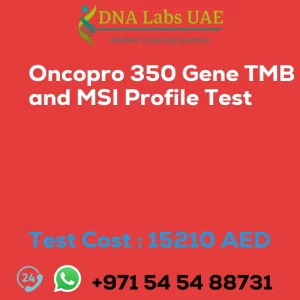IMMUNOHISTOCHEMISTRY CARBONIC ANHYDRASE-9 CA-9 Test
Welcome to DNA Labs UAE, a leading genetic laboratory offering a wide range of tests for various medical conditions. In this blog post, we will discuss the IMMUNOHISTOCHEMISTRY CARBONIC ANHYDRASE-9 CA-9 Test, its components, cost, symptoms, diagnosis, and more.
Test Components and Price
The IMMUNOHISTOCHEMISTRY CARBONIC ANHYDRASE-9 CA-9 Test is priced at 510.0 AED. The test requires a tumor tissue sample submitted in 10% Formal-saline or a Formalin fixed paraffin embedded block. The sample should be shipped at room temperature. Additionally, a copy of the Histopathology report, site of biopsy, and clinical history should be provided.
Report Delivery
The sample is delivered daily by 6 pm, and the report is usually available within 5 days for a tissue biopsy and 7 days for a tissue large complex.
Method and Test Type
The IMMUNOHISTOCHEMISTRY CARBONIC ANHYDRASE-9 CA-9 Test is performed using the immunohistochemistry method. It is primarily used for cancer diagnosis and is commonly requested by oncologists. The test falls under the HISTOLOGY department.
Pre Test Information
Prior to the test, it is important to provide a copy of the Histopathology report, site of biopsy, and clinical history. This information helps in accurate diagnosis and interpretation of the test results.
Test Details
The IMMUNOHISTOCHEMISTRY CARBONIC ANHYDRASE-9 CA-9 Test is used to detect the presence of CA-9 protein in tissue samples. CA-9 is an enzyme responsible for maintaining the pH balance within cells and is primarily found in certain types of cancer cells, such as renal cell carcinoma.
The test involves staining tissue sections with specific antibodies that bind to CA-9 protein. This allows the visualization of CA-9 expression in the tissue sample under a microscope. The staining pattern and intensity provide valuable information about the presence and distribution of CA-9 in the tissue.
The IMMUNOHISTOCHEMISTRY CARBONIC ANHYDRASE-9 CA-9 Test is commonly used in the diagnosis and prognosis of renal cell carcinoma. It helps differentiate between different subtypes of renal cell carcinoma and guides treatment decisions. CA-9 expression is also associated with tumor aggressiveness and poor prognosis, making it a valuable marker for predicting patient outcomes.
In conclusion, the IMMUNOHISTOCHEMISTRY CARBONIC ANHYDRASE-9 CA-9 Test offered by DNA Labs UAE is a valuable tool in cancer diagnosis and management. It provides important information about tumor characteristics, helps guide treatment decisions, and predicts patient outcomes. If you have any further questions or would like to schedule a test, please contact our oncologist.
| Test Name | IMMUNOHISTOCHEMISTRY CARBONIC ANHYDRASE-9 CA-9 Test |
|---|---|
| Components | |
| Price | 510.0 AED |
| Sample Condition | Submit tumor tissue in 10% Formal-saline OR Formalin fixed paraffin embedded block. Ship at room temperature. Provide a copy of the Histopathology report, Site of biopsy and Clinical history. |
| Report Delivery | Sample Daily by 6 pm; Report Block: 5 days Tissue Biopsy: 5 days Tissue large complex : 7 days |
| Method | Immunohistochemistry |
| Test type | Cancer |
| Doctor | Oncologist |
| Test Department: | HISTOLOGY |
| Pre Test Information | Provide a copy of the Histopathology report, Site of biopsy and Clinical history. |
| Test Details |
The immunohistochemistry carbonic anhydrase-9 (CA-9) test is a laboratory technique used to detect the presence of CA-9 protein in tissue samples. CA-9 is an enzyme that plays a role in maintaining the pH balance within cells. It is primarily found in certain types of cancer cells, such as renal cell carcinoma. The test involves staining tissue sections with specific antibodies that bind to CA-9 protein. This allows the visualization of CA-9 expression in the tissue sample under a microscope. The staining pattern and intensity can provide information about the presence and distribution of CA-9 in the tissue. The immunohistochemistry CA-9 test is commonly used in the diagnosis and prognosis of renal cell carcinoma. It can help differentiate between different subtypes of renal cell carcinoma and guide treatment decisions. CA-9 expression is also associated with tumor aggressiveness and poor prognosis, making it a valuable marker for predicting patient outcomes. Overall, the immunohistochemistry CA-9 test is a valuable tool in cancer diagnosis and management, providing important information about tumor characteristics and helping guide treatment decisions. |








